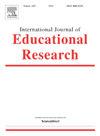Decoding digital empowerment: Key factors and practical mechanisms in teaching decisions-A grounded theory study
IF 2.6
3区 教育学
Q1 EDUCATION & EDUCATIONAL RESEARCH
引用次数: 0
Abstract
The rise of educational informatization underscores the crucial role of digital technology in empowering teachers’ decision-making processes. Understanding this empowerment’s essence, process, and mechanism is critical for educational development. This study employs grounded theory, using semi-structured interviews with 23 teachers from different universities worldwide. Through three levels of coding, a theoretical model of digital empowerment in teaching decision-making was constructed, revealing key factors and practical mechanism. The study identified five key factors: environmental factors, technological conditions, student development, teaching efficacy, and teacher qualifications. These factors function independently and interactively, influencing decision-making. Teachers, as the main agents, need to combine external environmental factors and technological conditions with their willingness to ensure teaching decisions meet both developmental and institutional needs, demonstrating feasibility and compatibility. This study enhances the understanding of the internal mechanism of digital empowerment in teaching decision-making, improving the theoretical framework and providing guidance for university teachers to better use digital tools.
解码数字赋权:教学决策中的关键因素和实践机制--一项基础理论研究
教育信息化的兴起凸显了数字技术在增强教师决策过程中的关键作用。了解这种赋权的本质、过程和机制对教育发展至关重要。本研究采用基础理论,对来自全球不同大学的 23 名教师进行了半结构化访谈。通过三个层次的编码,构建了教学决策中数字赋权的理论模型,揭示了关键因素和实践机制。研究发现了五个关键因素:环境因素、技术条件、学生发展、教学效能和教师资质。这些因素既独立运作,又相互作用,对决策产生影响。教师作为主体,需要将外部环境因素和技术条件与自身意愿相结合,确保教学决策既符合发展需要,又符合制度需要,体现出可行性和兼容性。本研究加深了对教学决策中数字化赋权内在机制的理解,完善了理论框架,为高校教师更好地使用数字化工具提供了指导。
本文章由计算机程序翻译,如有差异,请以英文原文为准。
求助全文
约1分钟内获得全文
求助全文
来源期刊

International Journal of Educational Research
EDUCATION & EDUCATIONAL RESEARCH-
CiteScore
6.20
自引率
3.10%
发文量
141
审稿时长
21 days
期刊介绍:
The International Journal of Educational Research publishes regular papers and special issues on specific topics of interest to international audiences of educational researchers. Examples of recent Special Issues published in the journal illustrate the breadth of topics that have be included in the journal: Students Perspectives on Learning Environments, Social, Motivational and Emotional Aspects of Learning Disabilities, Epistemological Beliefs and Domain, Analyzing Mathematics Classroom Cultures and Practices, and Music Education: A site for collaborative creativity.
 求助内容:
求助内容: 应助结果提醒方式:
应助结果提醒方式:


